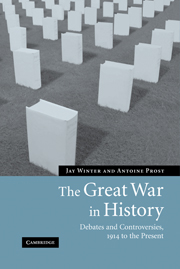Book contents
- Frontmatter
- Contents
- Preface to the English edition
- Introduction
- 1 Three historiographical configurations
- 2 Politicians and diplomats: why war and for what aims?
- 3 Generals and ministers: who commanded and how?
- 4 Soldiers: how did they wage war?
- 5 Businessmen, industrialists, and bankers: how was the economic war waged?
- 6 Workers: did war prevent or provoke revolution?
- 7 Civilians: how did they make war and survive it?
- 8 Agents of memory: how did people live between remembrance and forgetting?
- 9 The Great War in history
- Bibliography
- Index
- Studies in the Social and Cultural History of Modern Warfare
9 - The Great War in history
Published online by Cambridge University Press: 05 June 2012
- Frontmatter
- Contents
- Preface to the English edition
- Introduction
- 1 Three historiographical configurations
- 2 Politicians and diplomats: why war and for what aims?
- 3 Generals and ministers: who commanded and how?
- 4 Soldiers: how did they wage war?
- 5 Businessmen, industrialists, and bankers: how was the economic war waged?
- 6 Workers: did war prevent or provoke revolution?
- 7 Civilians: how did they make war and survive it?
- 8 Agents of memory: how did people live between remembrance and forgetting?
- 9 The Great War in history
- Bibliography
- Index
- Studies in the Social and Cultural History of Modern Warfare
Summary
Historical writing about the Great War forms a tableau of a rich and varied kind. Virtually all of those who lived through the war have passed away. But the further the event fades into the past, the more interest in it seems to grow. Today we have thousands of books, well-stocked journals, fascinating and heated debates at colloquia, museums, films. A large multi-disciplinary community of scholarship exists, including alongside historians, literary scholars, art historians, sociologists, anthropologists, jurists. It took generations to create this scholarly milieu.
The achievements have been considerable. Part of them is due to the explosion of the university sector itself. In all countries, despite national differences, the academic profession has grown in a manner and at a pace which their predecessors could not have imagined. The student body has grown exponentially too; they now number in the millions, and those who study history in the tens of thousands. This difference in scale has led to changes in kind. Where there once was a small number of individuals, there is now an entire scholarly community.
For historians, the gains have been made possible by the accumulation of evidence, by the opening of archives, by the enlargement of the repertoire of potential sources: monuments, commemorative plaques, postcards, objects of all kinds, buried remains and objects discovered on battlefields, and so on. To construct a history of the Great War is first and foremost to treat critically this immense and growing body of material.
- Type
- Chapter
- Information
- The Great War in HistoryDebates and Controversies, 1914 to the Present, pp. 192 - 213Publisher: Cambridge University PressPrint publication year: 2005



